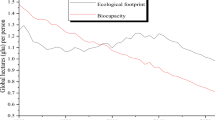Abstract
Geo-scientists and economists carry on discussions of central problems of economic growth, including global warming and resource exhaustion, on the basis of sharply diverging assumptions about limits to economic growth. These divergent assumptions can be traced at least to the debate over N. Georgescu-Roegen's work on entropy and economic production. Limited evidence indicates that economic growth sufficient to raise world average productivity to current European standards is at the edge of feasibility in terms of renewable energy. Rosy expectations that information technology can produce a “new” economy not subject to the resource and social limitations of traditional capitalism confuse new methods of appropriation of surplus value as rent with new methods of producing value. While the world economy will almost certainly transform from the small population, low labor productivity, rich fossil fuel-based resource base of the industrial revolution to a large population, high productivity, resource limited pattern, the social relations accompanying this change are far from certain or determined.


Similar content being viewed by others
Notes
External Professor, Santa Fe Institute. This is my talk as outgoing President of the Eastern Economics Association, delivered at the EEA meetings in Boston, Massachusetts, March 9, 2012. I am deeply indebted to Armon Rezai, Lance Taylor, and Eric Smith for extensive conversations on the themes of the talk. I would like to thank Sanjay Reddy for calling [Žižek 2012] to my attention.
The entropy relevant to Georgescu-Roegen's argument is thermodynamic entropy. In other contexts, I have discussed the informational entropy associated with economic allocations, but I’d like to emphasize that physical thermodynamic entropy and economic informational entropy, though they share the same terminology, refer to quite different concepts.
Solow has expressed more cautious second thoughts on these questions. “There is no reason at all why capitalism could not survive without slow or even no growth. I think its perfectly possible that economic growth cannot go on at its current rate forever… . It is possible that the United States and Europe will find that, as the decades go by, either continued growth will be too destructive to the environment and they are too dependent on scarce natural resources, or that they would rather use increasing productivity in the form of leisure” (Quoted in Stoll 2008).
References
Basu, D., and D.K. Foley . 2011. Dynamics of Output and Employment in the U.S. Economy, NSSR SCEPA PERI Working Paper Series.
Daly, H.E. 2008. Ecological Economics and Sustainable Development, Selected Essays of Herman Daly. Cheltenham, UK; Northampton, MA: Edward Elgar Publishing.
Ehrlich, P.R . 1971. The Population Bomb. New York: Macmillan, revised edition.
Foley, D.K. 2000. Stabilization of Human Population Through Economic Increasing Returns. Economic Letters, 68 (3): 309–317.
Foley, D.K. 2009. The Economic Fundamentals of Global Warming, in Twenty-First Century Macroeconomics: Responding to the Climate Challenge, edited by J.M. Harris and N.R. Goodwin. Cheltenham, UK and Northampton, MA: Edward Elgar Publishing.
Foley, D.K. 2011. The Political Economy of U.S. Output and Employment 2001–2010, NSSR SCEPA Working Paper Series.
Georgescu-Roegen, N . 1986. The Entropy Law and the Economic Process in Retrospect. Eastern Economic Journal 12 (1): 3–25.
Meadows, D.H., D.L. Meadows, J. Randers, W.W. III Behrens, and W. Watts . 1972. The Limits to Growth: A Report for the Club of Rome's Project on the Predicament of Mankind (A Potomac Associates Book), 2nd edn., New York: Universe Books.
Nordhaus, W.D. 2008. A Question of Balance: Weighing the Options on Global Warming Policies. New Haven: Yale University Press.
Nordhaus, W.D., and J. Boyer . 2000. Warming the World. Cambridge, MA: MIT Press.
Rezai, A., D. Foley, and L. Taylor . 2011. Global Warming and Economic Externalities. Economic Theory, 49 (2): 329–351, DOI: 10.1007/s00199-010-0592-4.
Solow, R.M. 1973. Is the End of the World at Hand? Challenge, 16 (1): 39–50.
Solow, R.M. 1974. The Economics of Resources or the Resources of Economics. The American Economic Review, Vol. 64, No. 2, Papers and Proceedings of the Eighty-sixth Annual Meeting of the American Economic Association, 1–14.
Stoll, S. 2008. Fear of Fallowing: The Specter of a No-Growth World, Harper's Magazine, http://harpers.org/archive/2008/03/0081958.
Taylor, L. 2008. Energy Productivity, Labor Productivity, and Global Warming, in Twenty-First Century Macroeconomics: Responding to the Climate Challenge, edited by J.M. Harris and N.R. Goodwin. Northhampton, MA: Edward Elgar.
U.S. Energy Information Administration. 2011. International Energy Outlook: 2011, Technical Report Report Number: DOE/EIA-0484(2011), http://205.254.135.7/forecasts/ieo/.
Žižek, S, 2012. The Revolt of the Salaried Bourgeoisie: The New Proletariat. LRB, 26 (January): 1–7.
Author information
Authors and Affiliations
Rights and permissions
About this article
Cite this article
Foley, D. Dilemmas of Economic Growth. Eastern Econ J 38, 283–295 (2012). https://doi.org/10.1057/eej.2012.10
Published:
Issue Date:
DOI: https://doi.org/10.1057/eej.2012.10




